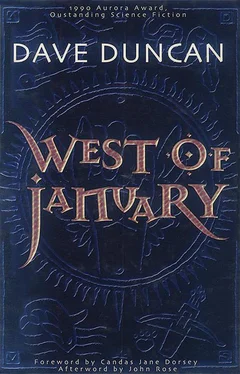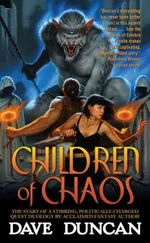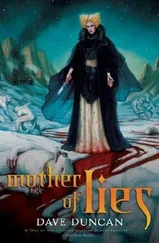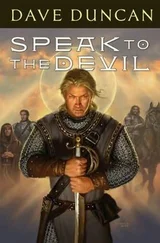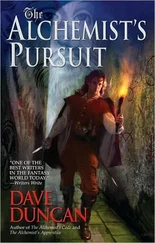“Shuck him?”
“Peel him, in strips. Did you ever watch a cat sharpen its claws?”
I had never even heard of cats, although later I met them. They are very like small versions of the panthers, without the third eye. Cats are said to be useful for catching small vermin, but I never liked them.
Being ripped to death had no appeal, either. “Does no one escape?”
Orange shook his head again. “Panthers are deadly and impossibly quick. Compared to a panther, you move like a snortoise. They can see body heat and watch you even when there is no light in the mine. They patrol the tunnels, guard the captives, catch game… Ants depend on panthers like seafolk depend on great ones.”
“Can they talk?”
“No. But they understand very complicated orders. They are very well trained. Don’t try it, Knobil—not until you’re ready to die.” He sighed as if he were reaching that point himself.
I was thinking that over when he added, “And don’t ever anger the ants or draw attention to yourself. They like to execute someone every now and again. It’s a good example. And entertainment. Anything but utter humility is savagely punished. You showed too much purpose in the way you came over to me. Look cowed!”
I grunted, trying not to show my dismay. This man was an angel? Then I caught his eye. For a moment the glazed, waxy look was missing. It flicked back again like a lid on a basket.
“Notice that there aren’t quite enough hides to go around?” he asked softly. “They watch who sleeps under cover and who doesn’t. You’re allowed to enjoy the women if you want—if you have any strength left after your shift, that is. But if you start getting possessive, then that’s noticed, too. Don’t go to the same one every time. Any slave who begins to gather status is marked.”
That was better! An angel would be an obvious leader, so he was merely being cautious.
“You mean there’s no way out except death?” I asked.
He hesitated, glanced at my hair, and then nodded. “That’s right.”
“What do the angels think about this slavery?”
“Ah!” He sighed. “There is a very remote chance that Heaven will raid the nest and release the slaves…this is a small tribe. But there are never enough angels, friend Knobil. Ants get their name because they keep slaves. The life of a mineworker is nasty and usually short, so why send your own sons into the pit when you can send someone else’s? Any traveler is fair game. In fact, ants are notorious for all sorts of violence. Sometimes one tribe will attack another and try to take its mine—that wouldn’t help us, though. There would just be more slaves. No ant army ever ends its march with fewer people than it started with, either.”
What, I asked, was an ant army?
For a while he did not reply, then he lay down. Puzzled, I copied him. “We re noticed, Knobil,” he mumbled, staring at the sky and barely moving his lips. “Friendships are dangerous. You mustn’t come near me now for a while—four or five tours, at least. So listen and I’ll explain.
“You know that every tribe, every people, moves west? That’s the law of nature. Herders and ranchers drift around, but overall they move west. Traders come and go, but even a trader ends his life farther west than he began it. Seafolk move north to warm seas or estuaries. They go south to round the capes and headlands—or sometimes across them if they must—but in the end they’re moving west like the rest of us. Forest springs up before Noon and withers a month or so west of Dusk, so you could say that the forests move, also, and so do the people who live in them. Even Heaven moves.”
I had known that the herdfolk stayed ahead of the sun…
“What happens if you get east of the sun, then?” I asked the sky.
He grunted as if surprised at my ignorance. “The sun goes away. You’re left with cold and dark and snow. Half of the world is black and covered with ice, Knobil.”
Angels were always talking about this “ice” thing—Brown had, too. I tried in vain to imagine a sky without a sun.
“The ants are different. Nature didn’t spread ores around evenly, like forest or grass. The ants have kept more of the old wisdoms—reading and writing, and even a few arcane things that the saints have forgotten, or so they say. The ice of Darkside and the floods of Dawn destroy everything. Nothing made by human hand can last from one cycle to the next, and the world is always born anew. The landscape is changed, the workings buried or stripped away, but the ants keep records that tell them where the nests were in the last cycle. Each tribe has its own list, I suppose. They probably try to steal one another’s, which may be why they like to move to a mine site as close to Dawn as they can get, right up in the wetlands, to take possession early.”
Orange could have had no idea how little of his lecture I was understanding, but I let him talk.
“And they’ll stay at a mine as long as possible—unless they know of a better one thawing out, of course. They say that an ant can be born and live and die all in the same place—the sun low in the east when he is born, passing high overhead as he grows, and low in the west when he is a very old man.”
To a herdman, accustomed to an unchanging sun, that idea was utter insanity. I wondered if captivity had driven this ex-angel mad.
“So, when a tribe of ants does move,” he continued, “it may cross almost the whole length of Dayside. A child could be conceived after its parents left one home, and be walking and talking before they reached their next. That’s an ant army—a nest on the move. There can be two or three hundred of them, or more. The opportunities for pillage are not always overlooked—slaving, too, if they get the chance.”
“Don’t the angels care?”
“Yes, they do! No matter what nonsense you’ve heard, the angels do care about the ants! They try to keep watch. A big army will have chariots hovering around it like sheepdogs, but it may be spread over a huge tract of terrain, and there are never enough angels.”
He sighed again. “And sometimes the sheep catch the dogs.”
Before I could ask what nonsense I was supposed to have heard, someone shouted a warning. Orange scrambled to his feet, telling me to do the same. Sleepers were hastily kicked awake, and the whole paddock of slaves lined up at attention as a party of ants approached. And then we were divided into gangs and marched off.
And I was shown what my father’s hymns and prayers had never succeeded in explaining to me when I was a child—what Hell was.
THAT FIRST DESCENT INTO THE PIT was worse than anything I had yet endured at the hands of my captors. I was assigned to a gang of five other men and a woman, under the supervision of a weedy, tufty-faced youth. He sent the others off to their labors and looked me over contemptuously. Then he gave me a list of the punishments he could inflict on me if he chose: confinement in total darkness, clawing, mutilation, lingering death. Him I could have broken in half with my bare hands, but he had his panther at his side, so I cringed and groveled and promised to be a good slave.
At the mouth of the mine we met the other shift coming out. I was told to choose a man of about my size and take his gear. Thus I found myself pulling on a stinking leather smock, stiff with old sweat and dirt, shabby and patched and abrasive. It barely reached my knees. The rest of my equipment consisted of a metal helmet, a pick, a canteen, and a candle. The ants, I noted, also wore iron-toed boots and heavy breeches. I would have settled for the breeches. I was ordered into the tunnel.
We were close to High Summer, and there were always fifty or more living beings in those workings, not counting cats, yet the dusty air was bitterly cold. I had never known cold before in my life. I had seen darkness in the waters beneath the seafolk’s grove, but this darkness had a weight and solidity all its own. The tunnel sloped gently, going on and on, relentlessly deeper, branching often. The faint flicker from my light showed rough wet walls pressing in on either hand. Ahead of me was thick, heavy blackness, into which I must force my unwilling body.
Читать дальше
